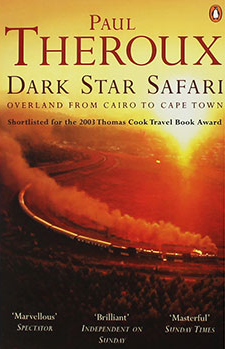 This book is simply magnificent. All of Theroux’s travel books that I’ve read have been engaging, but this one stands out above the rest for me. The premise here is simple: Theroux wants to travel overland through Africa, from Cairo to Cape Town. The cultural, geographical, and political contrasts he experiences are all brought to life vividly, but it is in his commentary on the state of African development that he expresses his opinions with a passion that I have rarely felt in his previous books.
This book is simply magnificent. All of Theroux’s travel books that I’ve read have been engaging, but this one stands out above the rest for me. The premise here is simple: Theroux wants to travel overland through Africa, from Cairo to Cape Town. The cultural, geographical, and political contrasts he experiences are all brought to life vividly, but it is in his commentary on the state of African development that he expresses his opinions with a passion that I have rarely felt in his previous books.
This is less surprising when you know that Theroux spent several years in the 1960s working in Malawi and Uganda, originally for the Peace Corps, then as a teacher and finally as a lecturer. He revisits his old haunts, and is moved by what he sees – namely that things have either stagnated or, more often, deteriorated. The picture he paints of east Africa in his day is one where progress – in its broadest sense – was most definitely on the horizon. Now, it seems, that promise is slipping further and further away to the point of being a mere speck.
Theroux, as you would expect, makes no bones about laying blame squarely at the feet of the morally weak, but politically strong leaders who emerged in parts of post-colonial Africa. Some of the terror they wreaked is graphically described to Theroux by former political prisoners he meets on his journey. However, it is not just this set of despots that come in for criticism. Theroux also lambasts the international aid organisations for both their policies and their attitudes.
As he goes deeper into the dark star continent, Conrad’s Heart of Darkness crops up time and again. At one point Theroux explicitly states that he is not turning into Kurtz. Far from it. Surely Theroux is Marlow – the book’s central character – making the journey and being deeply affected by all that he sees. Kurtz is represented by the donor culture that ends up doing more harm than good, and with more influence than is healthy.
A recurring image of the book is of aid workers driving with “ministerial haughtiness” in white Land Rovers and refusing to pick him up, or help him out in any way. “This was to be fairly typical of my experience with aid workers in rural Africa: they were, in general, oafish self-dramatizing prigs and often, complete bastards,” says Theroux, who does a good job of letting us learn with him of the issues and problems that beset much of Africa, rather than proseletyzing from the outset.
“This was the era of charity in Africa, where the business of philanthropy was paramount… Name an African problem and there was an agency of a charity to deal with it, but that did not mean a solution was produced. Charities and aid programs seemed to turn African problems into permanent conditions that were bigger and messier.”
As his thinking develops, the agents of virtue – the charity workers – become agents of subversion.
“The whole push was misguided… Where were the Africans in all this? In my view aid is a failure if in forty years of charity the only people still dishing up the food and doling out the money are foreigners. No Africans are involved – there is not even a concept of African volunteerism or labor-intensive projects. If all you have done is spend money and have not inspired anyone, you can teach the sharpest lesson by turning your back and going home.”
Critics have sniped at Theroux for not engaging more fully with the challenges of aid in Africa; for not delving into the macrocharity of World Bank loans, and IMF restructuring plans. He does, in fact, mention such things and also cites plenty of other books that set out to explain the situation in far more detail. His own thoughts are anecdotal, but he does talk to a very broad spectrum of people so his ‘research’ certainly has merit. And we should not forget that this is not what Theroux is about. He is not trying to write a book about development; he is writing a book about his trip.
One of the things I like about Theroux as a travel writer is that you are generally made aware of the craft; the notetaking, the scribbling during interviews, the paradox of being lonely while relishing the escape from a world of e-mails and phone calls; the enjoyment of the process of travel, tempered by the uncomfortable realities of delayed trains, overcrowded buses, and poorly repaired trucks. However, occasionally, you do begin to wonder quite how it all fits together. In Kampala, Theroux sends his wife a fax to “reassure her I was muddling along”. He tells us that upon reading it her reaction was “Poor Paulie, all alone.” There are few times in any of Theroux’s works that I ever feel sorry for him.
Overall verdict: Theroux on imperious form.
Penguin, 2003
